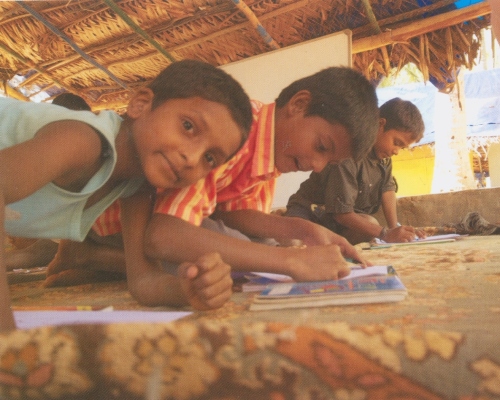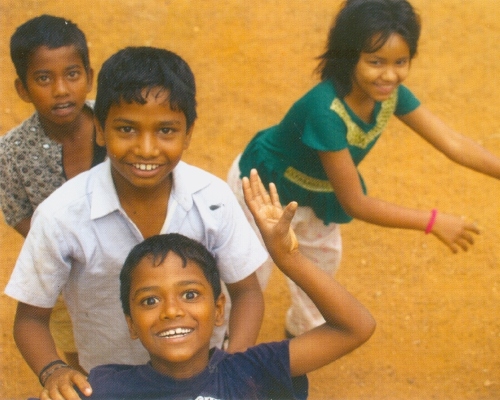
When we drove down to Ananya Trust, little did we realize what a fun day lay ahead of us. Reaching there bright and early, even before classes began, gave us enough time to tour the premises. Infact since most of the teachers hadn’t arrived, were taken around by one of the students themselves – Yedumma. Just a minute of interacting with him and we realized that the education being given by the Ananya Trust is no ordinary one. He spoke to us in English – fluent and clear. We also got a nice insight into life at Ananya from a student’s point of point. From early morning yoga/sports activities, to chores, to studies, to football in the evening, then dinner – their days are fun-filled and packed. But it was only when we got talking with Shashi Rao, Founder & CEO, later that we realized how truly unique a place Ananya is.
Starting from their approach to teaching and education. This is especially notable in today’s scenarios where school schedules are stressful and exams quite burdening. In Shashi’s own words, “Why not create an education system that turns everything on its head? So we do everything that mainstream schools will not do – starting with no hierarchical division of children, so we don’t have children going up or down the ladder or saying you’re very good – you’re being promoted. We have children who are grouped by abilities and their ability to understand; the pace at which they learn has more to do with their abilities.” Her take on learning is just as interesting. She says, “Most of the learning in mainstream schools happens laterally. In the 1st standard, you’re supposed to know this, this and this. There is a standard curriculum which has been setup. Then somebody tests you. And then they decide you go to the next class. And then again you’re supposed to know this, this, this. It’s a very lateral way of learning. And what we decided is that let us have a combination of lateral and vertical. So that even if a child is at the first level of learning in languages, let them remain at first level for one year, two years, however long it takes. But if they are very good at Maths, they can go upto the third level – you know pick up the concepts. And even in Maths, they might be able to add very fast, but when it comes to subtracting, they suddenly don’t understand the concept and they can’t do it. So, we just let them. So, they’re doing subtraction at the first level and Maths addition at the third level. Or they’re doing multiplication at the first level, subtraction at the second level, and addition at the fourth or fifth level, it doesn’t matter. So each child you find is at a different level at different things.”
Another striking and important aspect of Ananya Trust is that the children spend the weekdays at the school and are required to go home over the weekend. While this continues to expose the children to the difficulties at home, it’s an important step to help them maintain the family bond and stay connected with their roots and reality. As Shashi says, “These are children that come from backgrounds where anger is a normal part of their life. Violence is a normal part of their lives. So, to tell them don’t beat up, that’s all they have seen. You can’t change that. So we work with them and say, yes, you felt like beating but was there some other way that you could have handled it? So, for example, one big issue we have is bad words. You know, using swear words. It’s a normal part of their lives. That’s their life!”
She adds, “We don’t use words like -it’s good and bad. We just say, you know, can we use another way to express ourselves? So we try to be as non-judgmental as possible.” (Check out Shashi Rao conducting a class to improve listening and concentration skills of the children).
 Pressure begets worries and destroys creative thinking. This has been well understood by Ananya. Which is why at grade 10, those who don’t (or those who Ananya feels are not capable of) want to do the mainstream examination, are free to we opt for vocational training instead. “Usually from 16 we start identifying – we have a life skills and a soft skills course which happens with the older kids. So we send them out for some kind of on-the-job training. And we are networking very, very effectively and very vigorously. We are networking with a whole lot of prospective employers, who we feel are willing to give our children a chance even without a formal qualification,” says Sashi. They try to find data entry jobs for children who can sit at the computer for hours. And courier delivery positions for children who are very restless and love to move around. So far, this technique has been working and their children have been doing very well.
Pressure begets worries and destroys creative thinking. This has been well understood by Ananya. Which is why at grade 10, those who don’t (or those who Ananya feels are not capable of) want to do the mainstream examination, are free to we opt for vocational training instead. “Usually from 16 we start identifying – we have a life skills and a soft skills course which happens with the older kids. So we send them out for some kind of on-the-job training. And we are networking very, very effectively and very vigorously. We are networking with a whole lot of prospective employers, who we feel are willing to give our children a chance even without a formal qualification,” says Sashi. They try to find data entry jobs for children who can sit at the computer for hours. And courier delivery positions for children who are very restless and love to move around. So far, this technique has been working and their children have been doing very well.
The role of an Ananya teacher is to enable the children to learn. So, even if a child says, “I don’t want to sit in your class, I want to play outside,” an Ananya teacher would say “You’re welcome to play outside but what would you like to do?” The teacher simply tries to convert all interaction into a learning experience. It’s the children who decide what they want to do.
“Ananya” means unique and this is clearly an apt name. As unique as the location of the school itself – on a coconut grove, on the outskirts of Bangalore. Stop by and spend a day at their open hut classrooms and you’re sure to have an “Ananya” experience!
Established in 2000, Give is the largest and most trusted giving platform in India. Our community of 2.6M+ donors have supported 2,800+ nonprofits, impacting 15M+ lives across India.
Discover more from
Subscribe to get the latest posts sent to your email.
